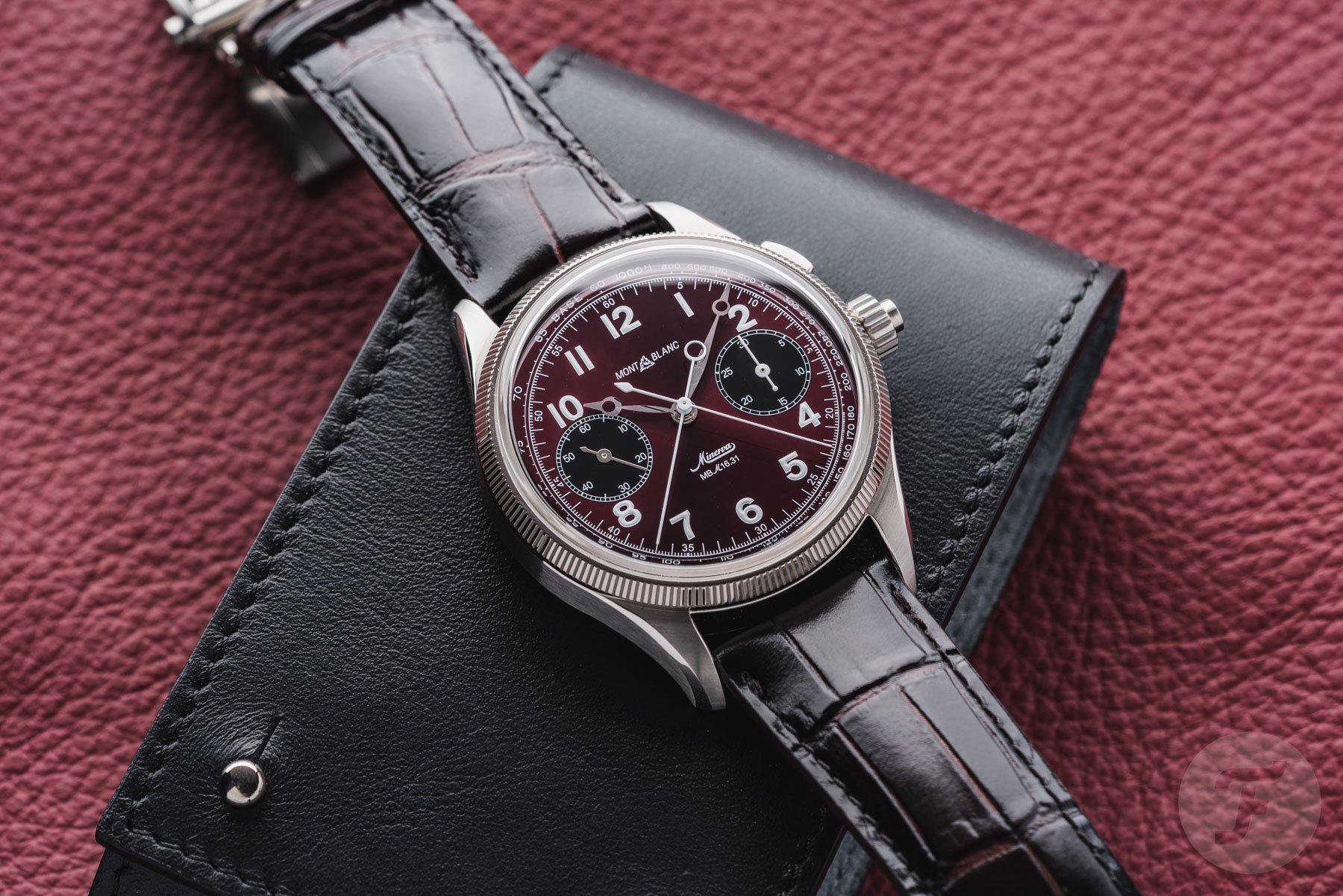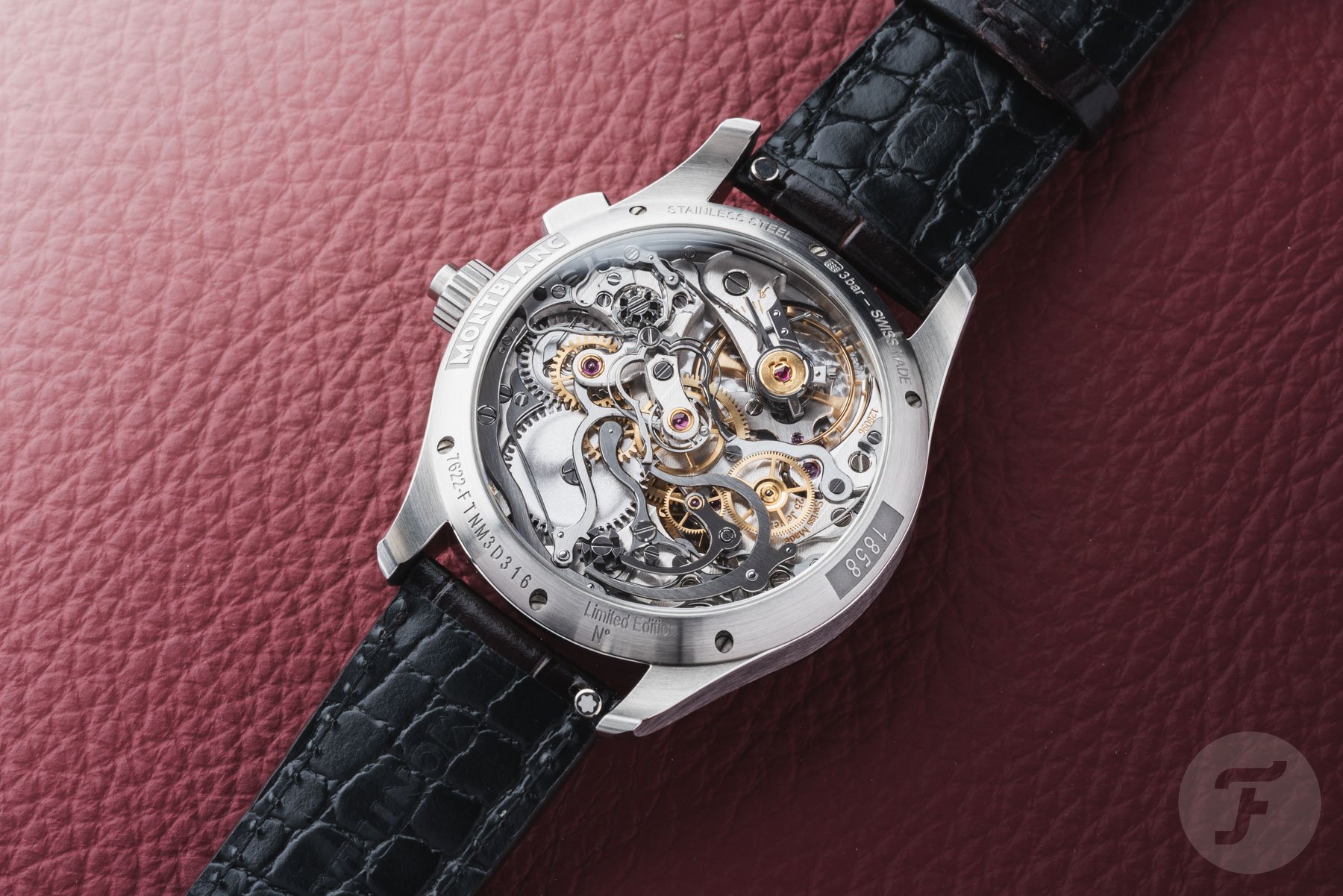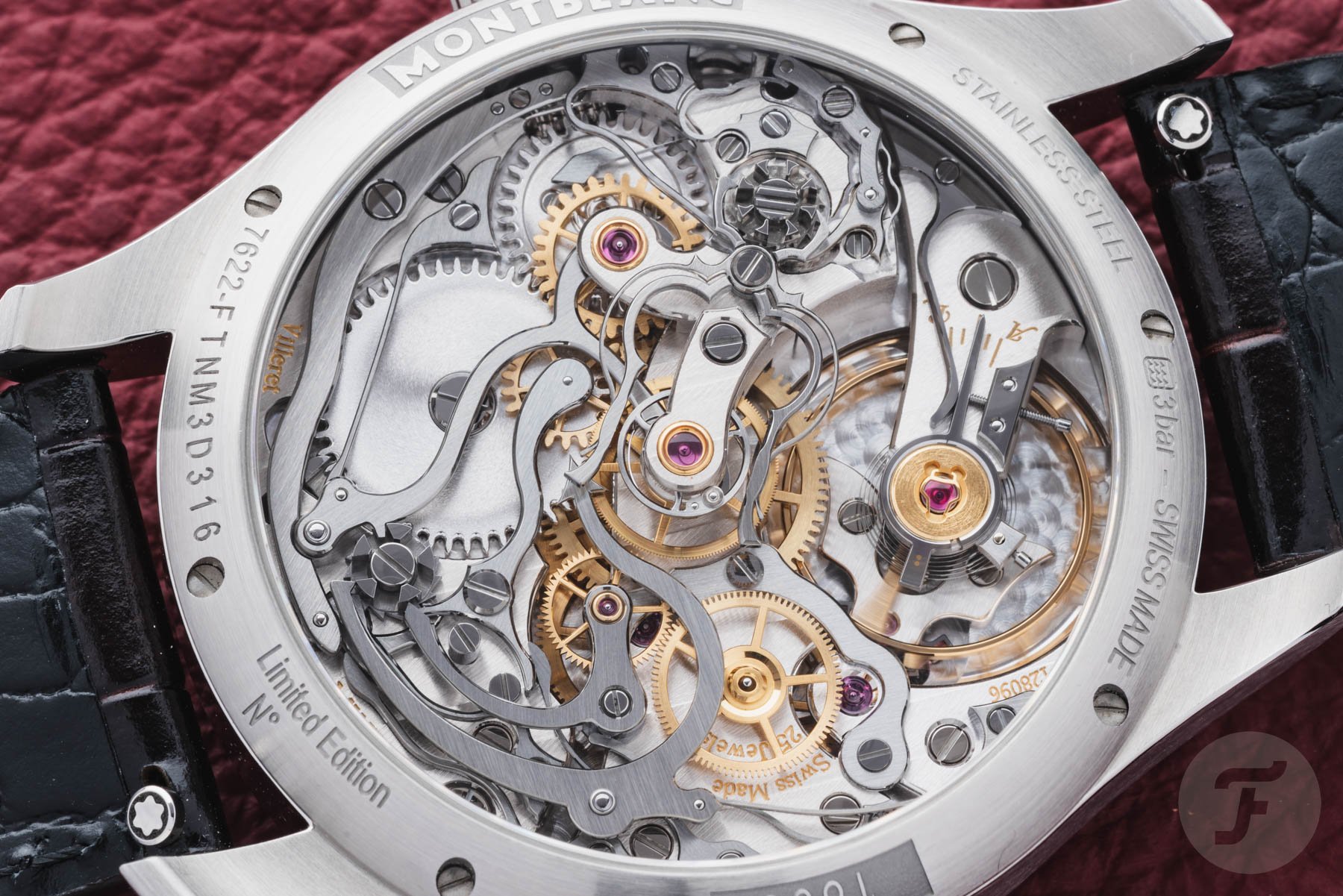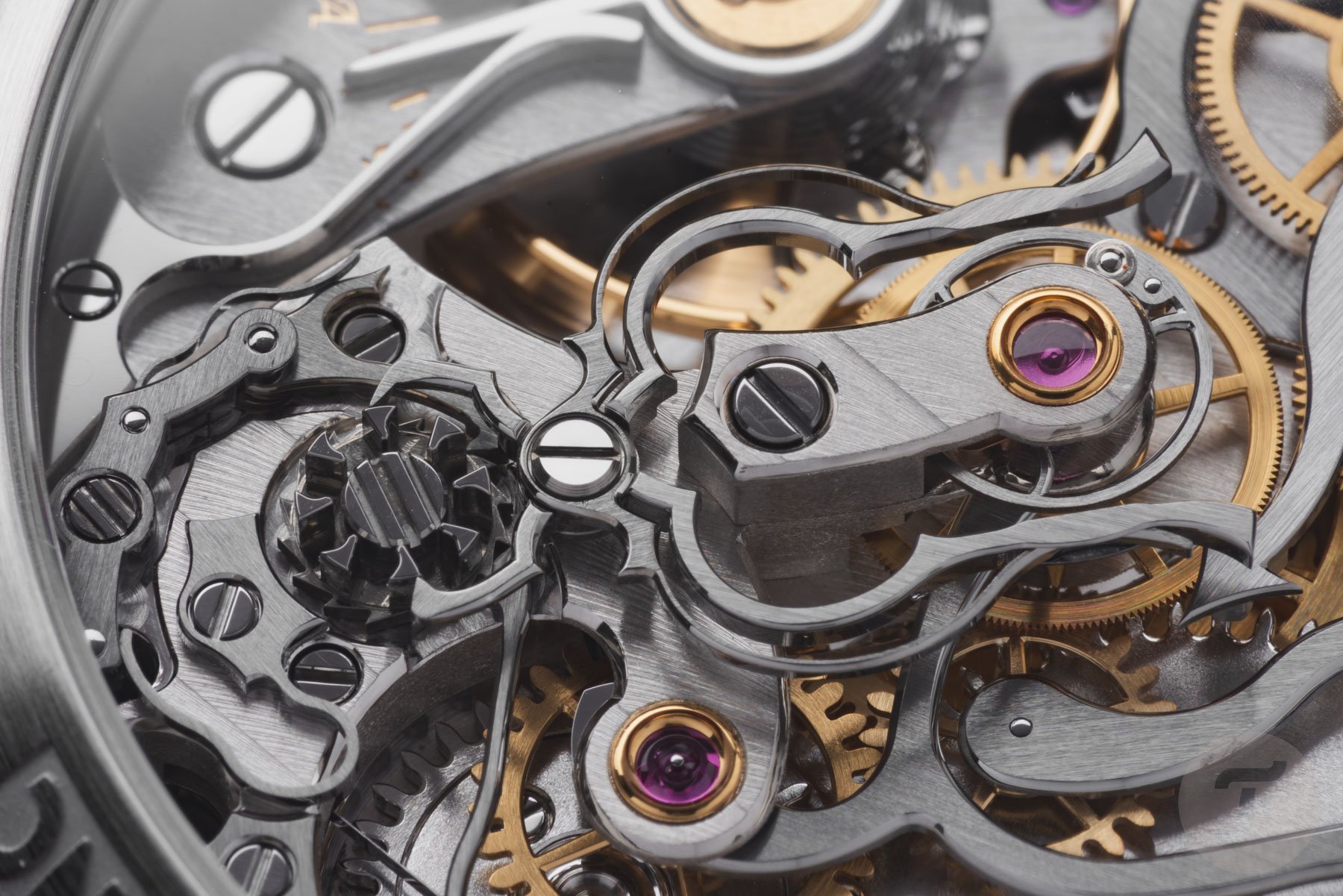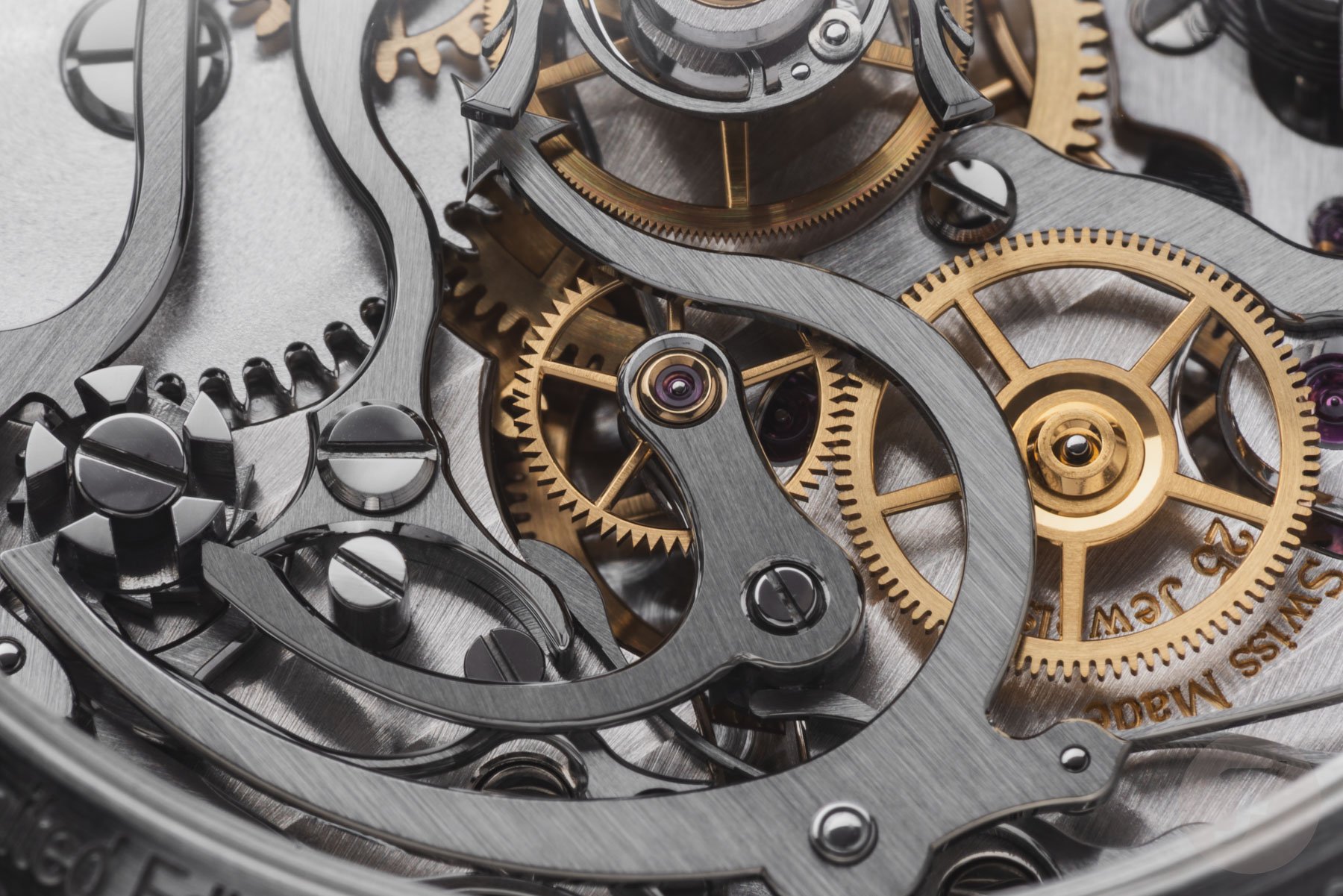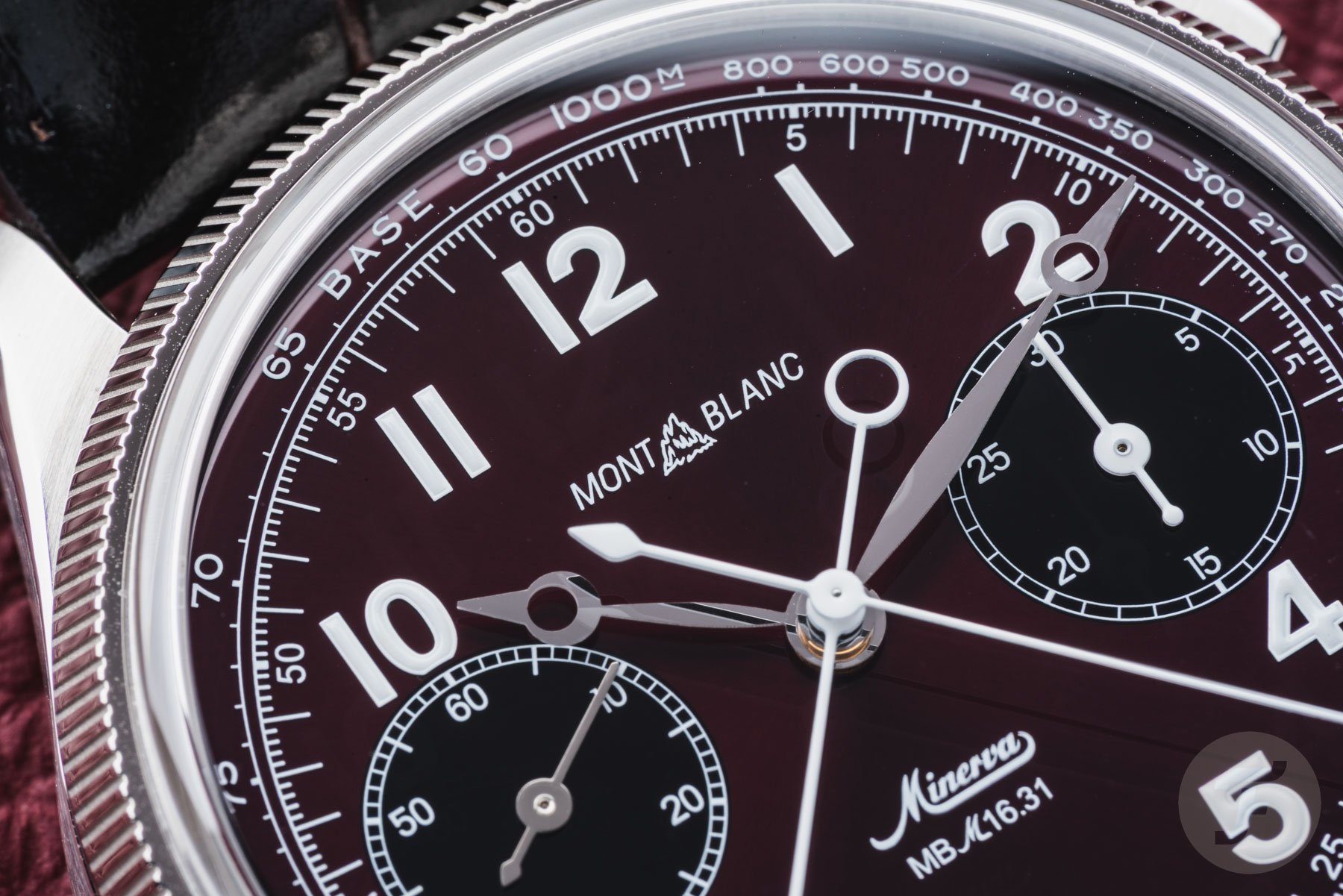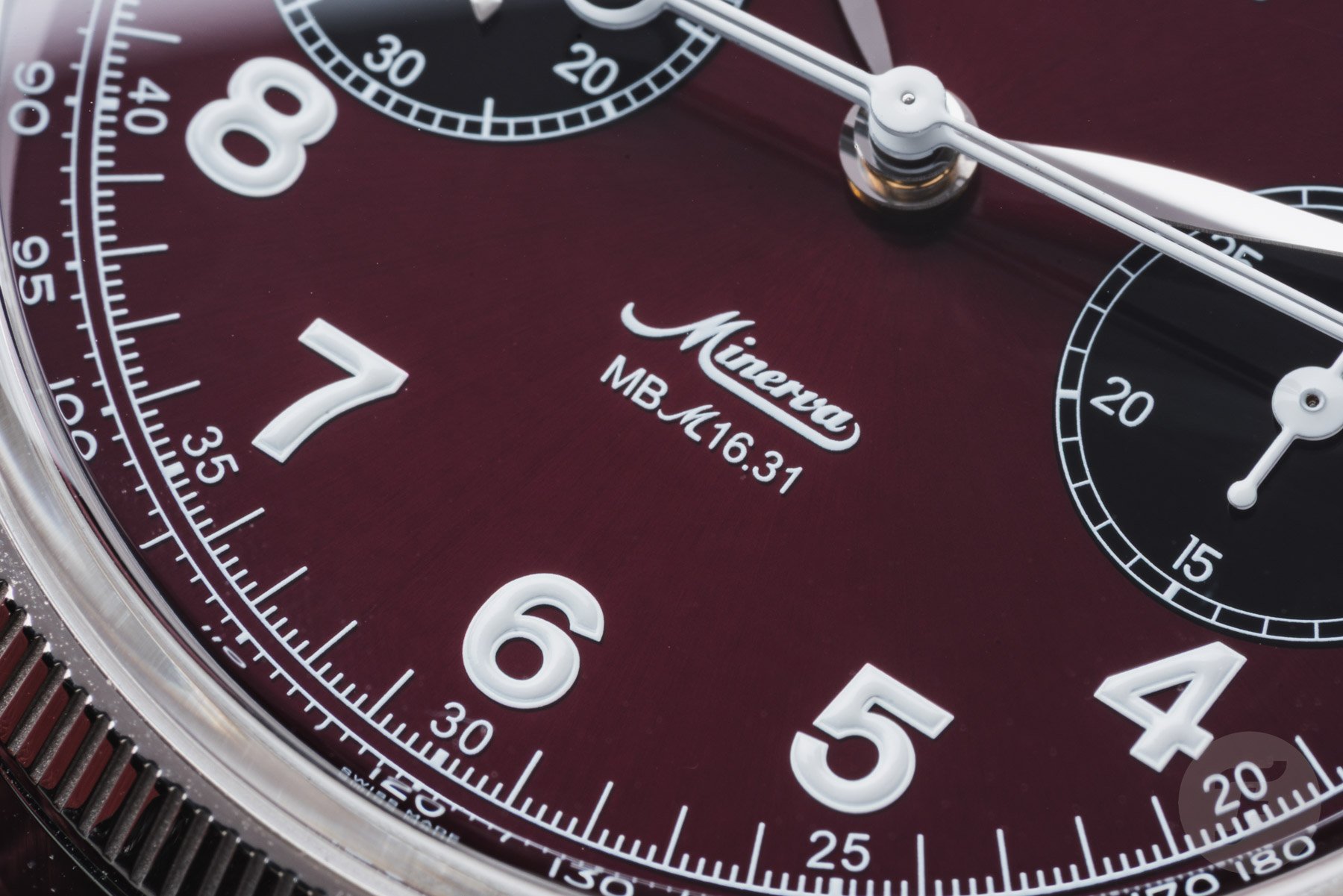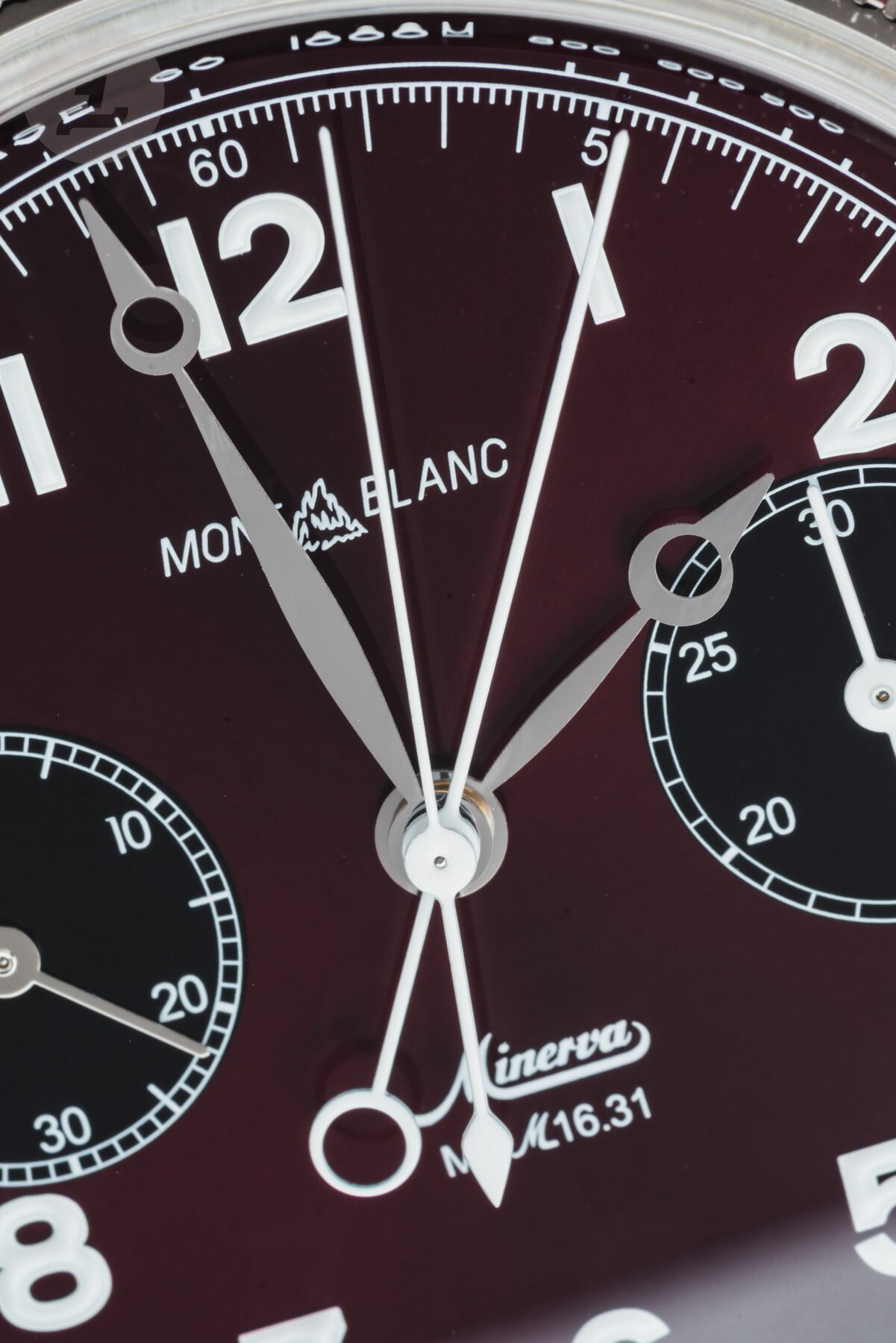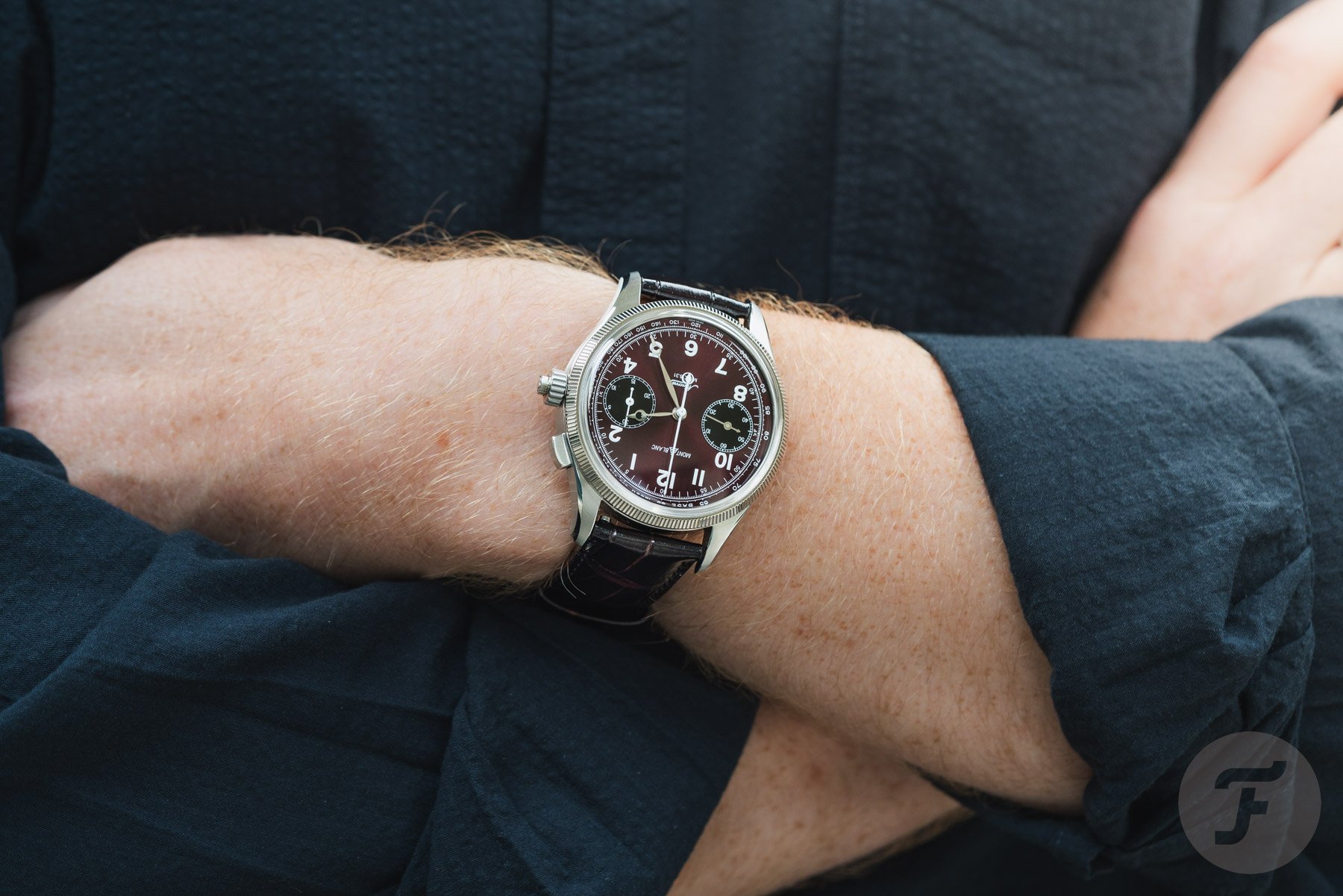Hands-On With The Montblanc 1858 Split Second Chronograph Limited Edition In Burgundy
A rattrapante, split-second, or double chronograph is not something you see every day. Such a chronograph, capable of measuring intermediate times without interrupting the ongoing measurement of a longer elapsed time, is a seriously complicated watch. For many, including me, the double chronograph is one of the most fascinating complications the world of Haute Horlogerie has to offer. And Montblanc has one on offer. It’s a split-second chronograph that sits in a long and fascinating timeline. The burgundy-dial Montblanc 1858 Split Second Chronograph Limited Edition is a rattrapante chronograph with a high-end, handmade, and hand-finished Minerva movement. The watch is limited to 100 pieces, meaning it will be a rarity, just like all creations of its kind. Luckily, one of those rare creations made its way to Fratello HQ, where we got to experience the magic of a top-end split-second chronograph.
This Montblanc 1858 Split Second Chronograph Limited Edition is not the first of its kind. In 2019, the 1858 Split Second Chronograph debuted in a limited edition of 100 bronze watches, a surprising material for a watch of the highest horological level. What followed was a titanium version with a blue Grand Feu enamel dial, a one-off for the Only Watch charity auction in titanium with a blue agate dial, and an 18-piece limited edition in Lime Gold with green details. Now Montblanc introduces a steel version with a white gold fluted bezel and a smoky burgundy dial in a limited run of 100 pieces. This 44 × 15.2mm watch is impressive and charismatic in equal measure. Yes, it’s big, but it also has great proportions. The colorway is warm, and the extra central seconds hand of the chronograph makes a watch lover’s heart jump.
The Montblanc 1858 Split Second Chronograph Limited Edition: The Minerva background
Richemont, the group of which Montblanc is a part, acquired Minerva in 2007. The Minerva brand name was first registered in 1886, but the brothers behind the brand, Charles and Hippolyte Robert, started their watchmaking atelier in Minerva in 1858, the year that’s in the name of the watch. Over time, Minerva became famous for its movements, such as its first chronograph caliber, the 19-9. Later, caliber 13.20CH, one of the first monopusher chronograph movements, debuted, and several remarkable movements followed.
What these well-regarded movements had in common was the high level of finishing. A Minerva movement stood out with its trademark V-shaped bridge and “devil’s tail,” the latter of which is, in fact, the arrow in the brand’s historical emblem that honors the Roman goddess of crafts (among other things, such as wisdom and war). The distinctive V shape of the bridge is inspired by the towering mountains outside the watchmaking atelier in Villeret.
Fast-forward to the 2000s, with Minerva in the hands of luxury watch conglomerate Richemont. What was the group going to do with Minerva — have it continue as a standalone brand or integrate it and its savoir faire into one of the brands in the portfolio? Panerai was keen to absorb it, but it was Montblanc that got lucky. In 2007, Minerva was affiliated with Montblanc, and the Villeret facility became the Institut Minerva de Recherches en Haute Horlogerie (Minerva Institute for High Watchmaking).
Producing grails
Montblanc watches with a Minerva heart were something special from the get-go. Our very own Andreas Ahrens saw the 2019 1858 Split Second Chronograph, and it became his grail watch, which he eventually bought. This is what he wrote about that watch:
“I learned that Montblanc, after Richemont bought Minerva and made it part of the brand, was offering high-end chronographs with hand-finished movements at surprisingly fair prices. In 2019, Montblanc presented the 1858 Split Second Chronograph. I could hardly believe it — a full-fledged traditional rattrapante with a dazzling, hand-finished movement! One of those chronographs then joined my collection.”
Andreas agrees that the watch is big, but I agree with him when he writes that “the M16.31 pocket watch movement inside requires these dimensions.” It’s tempting to call the hand-wound and hand-finished caliber MB M16.31 the star of the show. Yes, the dial and steel case with its finely fluted white gold bezel are also lookers, but the movement is a three-dimensional microspectacle. All the perfectly decorated surfaces stand out brilliantly, and when you know that Minerva produced the hairspring in-house, you see it with different eyes. Minerva chronograph movements are historically renowned for their beautiful architecture and finishing. The movement inside the new burgundy-dial rattrapante lives up to that reputation.
A look through the case back’s sapphire crystal reveals Geneva stripes, perlage on the base plate, bridges in rhodium-plated German silver, inner anglage, polished bevels, black polishing, circular graining, and a host of other old-school techniques applied by hand.
The dazzling 287-part MB M16.31
The power source of the new burgundy-colored rattrapante offers a look at the rich history of Minerva. The 287-part, 25-jewel caliber MB M16.31 pays homage to the historical pocket watch calibers 19-09CH and 17-29. This explains its generous 38.4mm diameter. Caliber MB M16.31 is a complicated evolution of the MB M16.29, as it now features an added split-seconds mechanism. It has two column wheels for the chronograph and split-second function, a horizontal coupling, and a 50-hour power reserve. The large balance wheel, with 18 screws and an in-house overcoil hairspring adjusted with a swan-neck regulator, beats at a calming frequency of 18,000 vibrations per hour.
44mm on the wrist
The Montblanc 1858 Split Second Chronograph Limited Edition takes inspiration from the 1930s 42mm military monopusher split-second chronographs. The large MB M16.31 needed a slightly bigger case to feel comfortable, so Montblanc opted for a 44mm one. Topping this steel case is a fixed and finely fluted 18K white gold bezel.
Yes, the watch sits prominently on the wrist, but since I’m used to wearing a round 44mm watch, my Chronoswiss Timemaster, it never felt too large or uncomfortable. When you wear this watch, you are fully aware you’re wearing it, but you also want to be fully aware because of what it is — a high-horology complication.
Even though I’m not the biggest fan of smoky dials, I make an exception for this one. The dark burgundy color with its radiant sunray decoration, contrasting black chronograph counters, and white luminescent Arabic numerals works wonderfully. The black sub-dials correspond to the dial’s dark edges, and the fresh white details provide lightness and excellent readability.
Classical hour, minute, and small seconds hands, white-lacquered central chronograph hands, and a 30-minute chronograph counter in the same color, complete a look I will describe as “lavish instrumental.” The tachymeter scale (base 1000) that runs around the dial won’t see much everyday use, I suspect. Still, it is a historical and functional nod to the original watch. It also puts the cherry on the cake of this impressive yet charming rattrapante.
Finally, the price of the burgundy-dial Montblanc 1858 Split Second Chronograph Limited Edition
This watch comes equipped with a dark burgundy calfskin strap with an alligator print and a stainless steel dual-deployant clasp with a fine adjustment system. The strap, which has a quick-release system for easy tool-free swapping, is of great quality. Its color is rich and deep, and the calf leather feels soft and pleasant, showing a high level of finishing. Operating the folding clasp is a bit (too) complicated for my taste, but I understand why Montblanc uses it. A pin buckle on a watch that costs €60,000 is a faux pas in many people’s eyes.
And there is the price of the newest Montblanc 1858 Split Second Chronograph Limited Edition. Indeed, I deliberately waited to mention the price because Haute Horlogerie split-second chronographs rarely come with a five-digit price tag. I’m not saying this is a cheap watch in the slightest. However, it could put the mythical rattrapante on the achievable bucket lists of more watch aficionados than before.
Any thoughts on this Montblanc 1858 Split Second Chronograph Limited Edition? Is it grail-watch material? Please let me know in the comments section below.
This is a preferred-position post. Learn more.

